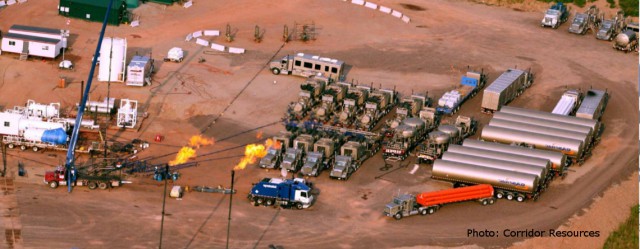Fredericton – Corridor Resources has registered Phase III of its Environmental Impact Assessment (EIA) which proposes to frack 4 gas wells in the McCully Gas Field at Penobsquis. The Conservation Council of New Brunswick (CCNB) has reviewed the proposal which is open for a public comment period, ending March 8, 2014. CCNB submits that while the EIA lacks rigour, it provides an opportunity to begin to implement the NB Chief Medical Officer’s previous work which recommended a Health Impact Assessment as part of the review of shale gas development in New Brunswick. The EIA registration by Corridor Resources states that the proposed activities for Phase III are:
- Completions and Development Activities on the O-76, D-48 and N-57 Well Pads
- Fracture stimulate wells on the O-76, D-48 and N-57 Well Pads using propane as the fracture fluid; and
- Connect the wells to the existing production gathering system
CCNB has reviewed the EIA registration document and feels that, while it relies heavily on a previous EIA submission (for well pad F67, October 2013), it is thin in information and that the ‘environmental’ study is primarily focused on plants and animals. There is relatively little to no information, analyses or rigorous assessment of impacts on air quality, water quality, geological fault stability, or hydrological connectivity in the watershed. And of glaring concern, it also lacks assessment of public health impacts.
On February 18, Chief Medical Officer of Health (CMOH), Dr. Eilish Cleary, told CBC New Brunswick that “we’ve [Public Health] already come forward with recommendations. And now what we have to do is translate those recommendations into operational plans.” The Conservation Council urges the Minister of Health to support Dr. Cleary in giving her the mandate and the resources to do this job.
“Government and industry has had very poor ability or will to incorporate public health into the formal assessments of these types of developments”, says CCNB’s Stephanie Merrill, who is currently undertaking a review of the opportunities and barriers to the incorporation of a Health Impact Assessment protocol into the province’s existing Environmental Impact Assessment process.
“Given the open EIA on the 2014 Penobsquis operations, plus the strong recommendations by the CMOH, plus the concern at the community level about a lack of assessment of public health impacts, this is an opportunity to begin to do that work” says Merrill.
There is very little opportunity or ability for the Department of Health to be full participants in the EIA unless they are invited into the process by the Department of Environment – the host of the process. Even then, participation is limited in scope. The CMOH has been clear, in the report released September 2012, that the Department of Health should be more actively and centrally involved to ensure that development projects, including shale gas, has limited negative health impacts.
In 2014, Corridor Resources plans on one hydraulic fracture and five fractures with liquid propane to increase production in an attempt to stimulate four existing wells, which have depleted, or failed to produce. Over the course of the four months, the five liquid propane fracks are projected to use 3,000,000 litres of liquid propane. The propane will be transported through the community using 100 tanker trucks. That same amount of liquid propane will be stored on four wellpads in 80 m3 storage tanks during 2014 operations. The EIA makes no mention of any potential public health or emergency measures concerns related to the transport, storage and use of 3,000,000 litres of liquid propane on four wellpads within 500m of 24 residences and outbuildings.
Just last week there was a well pad explosion on a Chevron site in Pennsylvania which killed one worker. The company undertaking the propane fracking, Gasfrac, has had at least one significant well fire from a propane frack in Alberta in 2011 which injured approximately a dozen onsite workers.
The EIA is currently open for public comment until March 8th. The Conservation Council of New Brunswick urges the public to participate in this process and make their concerns known to the Department of Environment and to the proponent, Corridor Resources:
Sheila Goucher
Project Manager
Environmental Assessment Branch
Department of Environment and Local Government
Phone: (506) 444-5382
Fax: (506) 453-2627
Email: Sheila.Goucher@gnb.ca
Dena Murphy
Health, Safety, Environment & Regulatory Affairs Manager
Corridor Resources Inc.
Office (toll free): 1-888-429-4511
Office (direct): 902-406-8011
Fax: 902-429-0209
Email: dmurphy@corridor.ca
-30-
Media Contact: Stephanie Merrill, Conservation Council of New Brunswick: 458.8747 (o), 261.8317 (c); water@conservationcouncil.ca
Background documents:

